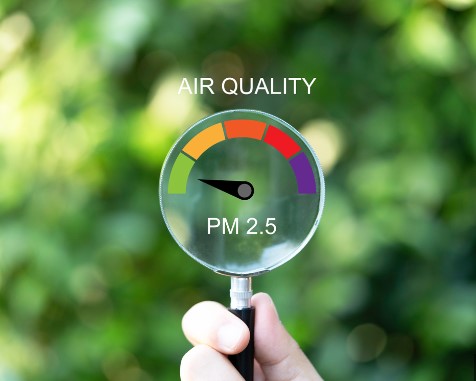Growing up in Houston can sometimes feel like living in an allergy battleground.
The city’s warm, humid climate creates the perfect conditions for allergens like mold, pollen, and dust mites to thrive year-round. The Houston air isn’t just heavy with allergens; the pollution from traffic and industry can accumulate to worsen air quality.
Poor air quality can disproportionately impact individuals with asthma and other lung conditions. The lung is vital in the respiratory system to perform essential functions that sustain life; they are responsible for the oxygenation of blood, carbon dioxide removal, energy production, blood pH regulation, and protection and defense from dust, microbes, and other airborne particles. Protecting the lungs is crucial for maintaining overall health and well-being.
Environmental pollutants are a significant risk factor for lung health, as they can cause both immediate and long-term damage to the respiratory system. Exposure to various pollutants can lead to or worsen lung diseases such as asthma, chronic obstructive pulmonary disease (COPD), and even lung cancer. Ozone pollution, particulate matter (PM), nitrogen dioxide and sulfur dioxide are major air pollutants that pose serious risks to lung health. Ground-level ozone, formed by reactions between sunlight and emissions from vehicles or industry, can irritate airways and worsen conditions like asthma. Particulate matter can penetrate deep into the lungs, leading to inflammation, reduced lung function, and even lung cancer. NO2 and SO2—often released from burning fossil fuels—can trigger respiratory symptoms and increase the risk of chronic lung diseases. These pollutants are also linked to climate change, which intensifies air pollution through rising temperatures and extreme weather.
To prevent lung damage from poor air quality, it’s important to take both personal and community-level actions. On a daily basis, individuals can wear masks in high-pollution areas, avoid outdoor activities during times of heavy traffic or high pollution alerts, and use air purifiers indoors. Keeping windows closed on bad air index days and avoiding indoor pollutants like harsh cleaning chemicals and smoke can also help.
On a larger scale, supporting clean energy, reducing car use by walking or biking, and advocating for stronger environmental regulations can help reduce overall pollution and protect everyone’s lung health. The air we share is the breath we take—let’s keep it clean for healthier lungs and a stronger future!








